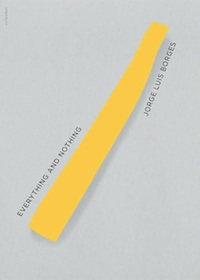Renovating Fiction

Forgive me if you have a problem with me honoring another dead white man but, in my world, to ignore the publication of a book by Jorge Luis Borges, who died in 1986, would be entirely unforgivable.
In this case, a new, compact anthology, Everything and Nothing (New Directions) by various translators (Donald A. Yates, James Irby, John M. Fein, and Eliot Weinberger) that the publisher claims “collects the best of Borges’ highly influential work” written in the 1930s and ‘40s—“anticipating, among other things, the internet, quantum mechanics, and cloning.”
Donald Yates’s introduction recalls:
Jorge Luis Borges
This pocket-sized mini-collection, containing 11 selections, includes “Borges and I,” “Tlön, Uqbar, Orbis Tertius,” “Death and the Compass,” and “Blindness.” There is a lot to be said about it and the author—striking, though, is the concise, almost terse string of blurbs that accrue to Borges:
Yes, indeed.
